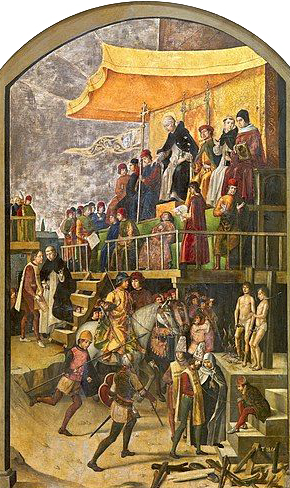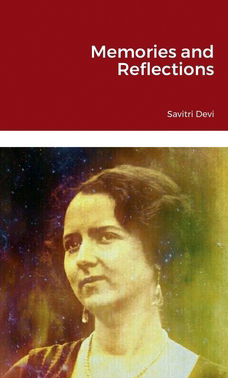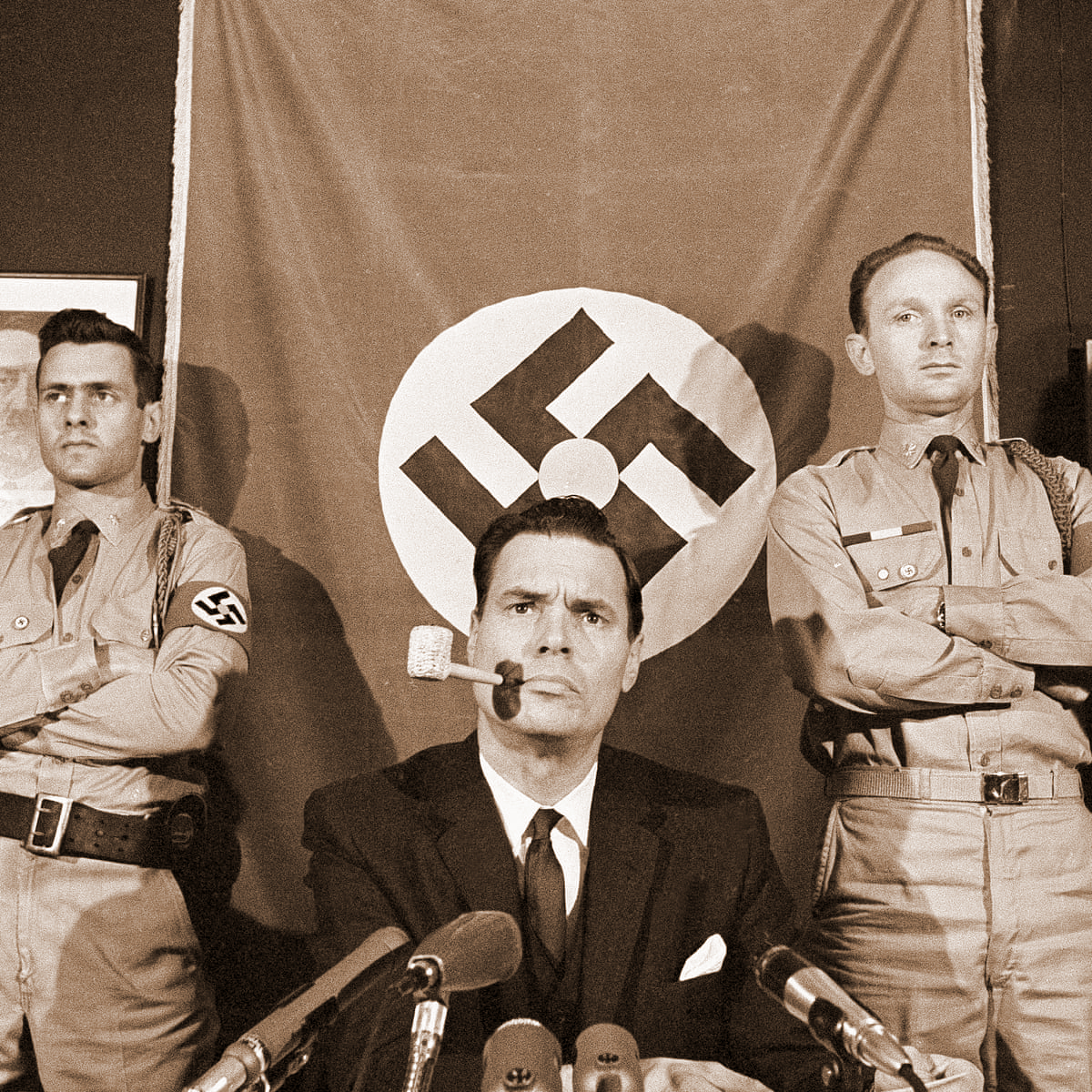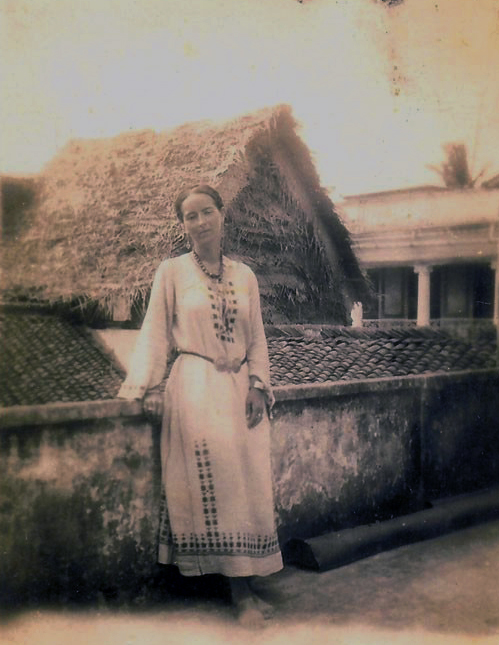Chapter II—False nations and true racism
‘We have to distinguish between the state as a vessel and the race as the content. This vessel only makes sense if it is able to preserve and protect its contents; otherwise it is worthless’.
—Adolf Hitler (Mein Kampf, 1935 edition, page 434)
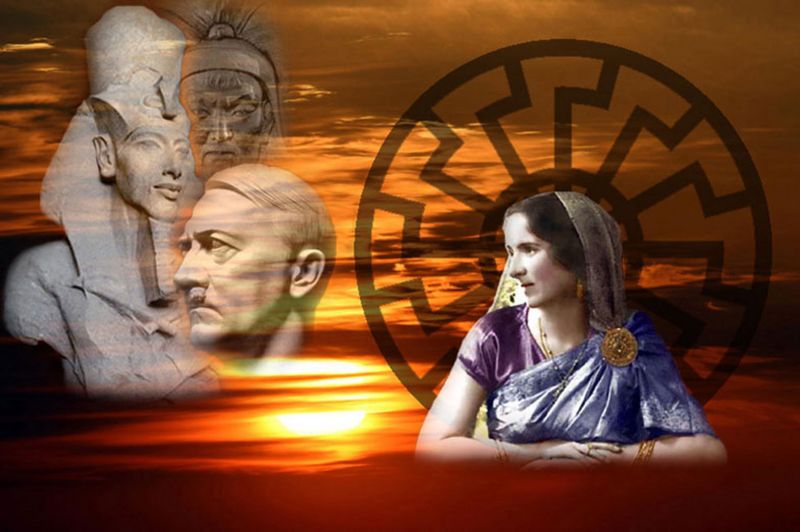
Do not forget that it is considerations of race which distinguish a real people from a collectivity of men which does not deserve the name.
Such communities can be very different from each other. There are states where the population is a deeply mixed mass, where specimens of ‘pure’ appearance, if there are any, have children who do not resemble them; where children of the same family, who nevertheless seems ethnically homogeneous, are different races: one Negroid, the other Mediterranean, or almost, the third, marked with strong Amerindian characteristics. These are states, not peoples. There is, for example, a Brazilian state. There is a population (multiracial, and without segregation laws) who inhabit Brazil. There are no Brazilian people—nor, therefore, a Brazilian ‘nation’.
There are, on the other hand, states whose populations are made up of several peoples juxtaposed, but not fused together. This is the case of the United States of America [Editor’s note: Remember that this was written in the late 1960s], the Union of South Africa, Rhodesia, the Soviet Union, and India. It is by an abuse of language that one gives to the general population of any one of these States, the name of ‘people’ or of ‘nation’. There is, in fact, no natural link, no biological link, between an ‘American citizen’ of Anglo-Saxon, Irish or Mediterranean origin, and another ‘American citizen’ Negro or mestizo, or Jew…
Moreover, in the USA, as in the so-called ‘racist’ states of Rhodesia and South Africa, and more, Aryans and Negroes belong to the same Christian churches; are Methodists, Anglicans, Lutherans, Catholics or ‘Jehovah’s Witnesses’, as the case may be, but always without distinction of race. Since the realm of the true Christian is not of this world, biological considerations cannot be included…
If, favoured by the diffusion of a uniform way of life as well as of a common ‘knowledge’, and especially of self-distant common anti-racist ‘values’, the gangrene of interbreeding is gradually gaining the entire population, it is, for this, the irremediable decadence: the end of all culture, the end of all disinterested creation, that is to say of any activity other than that which consists in ‘producing’ always more, in order to acquire more and more material well-being. If, on the contrary, it is the healthy tendency of each race to remain separate from the others that prevails, the population will retain its heterogeneity. It will not become ‘a people’—much less a ‘nation’. It will remain what it is, namely a juxtaposition of two or more races living in harmony with each other to the extent that their primary diversity is recognised and accepted. [Editor’s note: Again, writing in the 60s, Savitri ignored that that is impossible in the long run.]
The Union of South Africa, so decried by anti-Hitlerites around the world for its so-called ‘racism’, is not such a multiracial state, or only very incompletely, despite its official program of ‘separate development of races’. It is only very incompletely so because, just like Rhodesia which, for its part, denies exalting racism, and like the USA which, despite the continued resistance of its segregationists, is fighting it, it confuses, as I said earlier, ‘Aryan’ and ‘White’. [Editor’s Note: Living in Mexico I can say that the few Jews I have come to know are phenotypically white, sometimes completely indistinguishable from real Aryans except for their last names (see e.g., here). This means that from now on I will use the terms ‘Aryan’ and ‘White’ as Savitri used them; being the ‘Aryans’ those whites who don’t have Jewish blood, though many Ashkenazi Jews are white: something that Richard Spencer has acknowledged in one of his recent podcasts.]
Far, for example, from removing the Jews from key positions in the country and, in general, from any profession in the exercise of which they are likely to acquire political or cultural influence, it gives them, because of their colour alone, all the advantages enjoyed by the ‘Whites’, advantages that she refuses to the Aryans of Asia, however illogical that is, and that, even if, like most Brahmans and many ‘Khatris’ of Punjab, they are fair complexion. Crossbreeding between Aryans and Jews is not prohibited in the so-called racist Union of South Africa—any more than it is elsewhere. It has never been so in any country of Christian population, if the Jew—or the Jewess—had, by baptism, been received into the religious community of her partner. He was so only in the Third German Reich, a State whose true religion was that of Blood and Soil—and, it is again, since 1955, in the State of Israel, whose people believe themselves, to the exclusion of everything else, ‘chosen of God’.
It is true that wherever there are two or more human races, whose nations all or almost all adhere to a centred religion, like Christianity, in the long run a tendency of interbreeding emerges. All true racism implies the negation of the dogma of the immense value of ‘man’ whoever he may be; the negation of the ‘apart’ character of man, and his integration into all other living species; the negation of the legal equality of ‘souls’ as well as of men’s bodies.
______ 卐 ______
I will now tell you about India, so that you can once again be proud to be Aryan.
To understand the history of the peoples who inhabit this vast portion of the continent—which includes, in fact, in addition to the current ‘Indian Republic’, the two ‘Pakistans’[i] and the island of Ceylon; a surface, in all, equal to that of Europe minus Russia—you must refer to the distant time when the first Aryan tribes, coming from the North, descended in successive waves on the Pays-des-Sept-Rivières (the Sapta Sindhu of the Sanskrit Scriptures) by the famous Pass of Khaïber, the Voie des Couquérants.
It was, according to Bal Gangadhar Tilak, commonly called Lokamanya[ii] Tilak; this Brahmin of Maharashtra, both scholar and mathematician, who demonstrated it by astronomical considerations—before the fourth millennium before the Christian era, therefore at the time of the very first Egyptian dynasties, several centuries before the construction of the pyramids of Giza; at the time when, in Mesopotamia, the Sumerian civilisation flourished in its oldest centres: in Erech, in Nippur, in Eridu, some fifteen hundred years before Sargon of Akkad. And the Aryas—which, in Sanskrit, means ‘those who command’, in other words, the men of the race of the lords—came, still according to Tilak, from the far North. They were the brothers of those who, closer to the common cradle of the race, were one day to be called the Germans, the Hellenes, the Latins, and whose languages presented deep similarities with theirs. Their ancestors had lived beyond the Arctic Circle, at a time when the lands of this region still enjoyed a temperate climate—that is to say before the axis of our planet tilted further; twenty-three degrees. They had awaited in worship the return of the Sun—the victory of the Day after the long nights streaked with aurora borealis—and they had sung the splendour of the sky and venerated the stars (the ‘brilliant’ or ‘Devas’) which did not go to bed.
During the centuries that they had taken to cover, in stages, the immense distance which separated them from the divine arctic homeland, the Aryas had preserved some of these hymns. Their bards had composed others, and soon, during the gradual conquest of the hot lands, where to improvise new ones. For a very long time transmitted from mouth to mouth, 1009 of these poems—finally written—have come down to us. The whole constitutes the Rig Veda: the oldest sacred text in India, which pious Brahmans still chant today.
The Aryas were a few thousand—perhaps, over time, a few tens of thousands—in front of all these hostile peoples and tribes, which they called Dasyus, or dwellers of the woods, or the Rakshasas or demons. It is possible that they found, already in force in the society of Harappa and Mohenjo-Daro, a hereditary system of a division of labour. But it was they who gave such a system, if it existed, racial significance, and classified the population of India into immutable castes. They could not do otherwise if they wanted to preserve their physical and moral characteristics for their Aryan race, in other words, if they wanted to survive.
They probably began by mixing freely, if not with the Aborigines at least with the Dravidians, technically more advanced than them until they grasped, in all its tragic horror, the danger of interbreeding. It was then that the caste system was formed: the division of the population of the Indies into a minority of dwijas or twice-born Arya (because they had to know this ‘second birth’ which the spiritual initiation represents), and an immense majority of Shudras, people with dark skin, intended for servile work. At the bottom of the scale—out of all caste—were rejected the Negroids, Negro-Mongoloids and people of the Munda type: the oldest inhabitants of Indian soil. The ‘twice-born’ shared power. Spiritual authority was henceforth the privilege of the Brahmans; temporal power, that of the Kshatriyas; and this power which already gave, in a society much less attached than ours to material goods, wealth, born of commerce, the prerogative of the Vaishyas.
Disinterested scientific knowledge and above all spiritual knowledge was reserved for the Aryas, and very soon only for the Brahmans and Kshatriyas. It was unthinkable that a young Soudra, even exceptionally gifted—and all the more reason a Chandala, below any caste—were taught the supreme truths, or that he was taught to recite, even that recited before him the most beautiful invocations to the Devas or the most powerful ritual formulas. Frightful penalties awaited those who would have dared to transgress this defence, and those in favour of whom, it would have been transgressed.
Since then, many things have happened, many transformations have upset Indian society, like all societies. In spite of everything, forbidden unions took place; children were born whose parents did not belong to the same caste…
One could photograph and classify specimens of all both racial and professional groups in India. We would thus obtain a huge collection of types gradually going from Negroid or even Australoid to pure Aryan—an Aryan often purer than the majority of his brethren in Europe (at least in Southern Europe). There is maybe, very light, with brown or gray eyes (exceptionally blue or blue-green), hair ranging from black to reddish brown, with perfectly Indo-European features. It is little, one will say. This is a lot if we remember that at least sixty centuries separate the present day from the time when the first Aryan tribes emerged from the Khyber Pass.
In any case, the facts that I have just recalled here clearly show that the Indies are no more ‘a people’ than are the United States of America, the Soviet Union or the South African Union.
But there is a difference: while in each of these countries a common dogmatic faith, the dissemination of which is encouraged—and a clearly anti-racist faith, or one concerning the other world and indifferent to racial issues, let it be it is Marxism or any form of Christianity whatsoever—tends, in spite of everything, to bring the races together; constitutes, in any case, a permanent brake on the instinct of segregation, in India, it is the opposite which occurs. There the religious tradition itself proclaims the congenital inequality of ‘souls’ as well as of bodies, and the natural hierarchy of races, dominated by the Aryan race—in exactly the same spirit as Hitlerism—and thus encourages segregation.
Over the centuries, we have tried, either in the name of a philosophy denying Life, or in the name of ‘practical necessities’, to kill this racist tradition. We did not succeed. Buddhism referred its followers to monastic life, but had in practice as a result of mixing the castes without causing the extinction of the human species. He ended up being swept from India. Guru Govinda Singh, the founder of the Sikh warrior sect, had wanted to take his followers from all castes, claiming to take into account only the individual worth of each man. But this concern for combative efficiency, this requirement for essentially Aryan qualities such as the spirit of sacrifice, the sense of responsibility, the joyful acceptance of discipline, even a very hard one, etc., have resulted in it being mostly Hindus from Aryan castes who came to him. One only has to look at the Sikhs to see it. No Government of the present ‘Indian Republic’ will succeed where Guru Govinda Singh and, centuries before him, the Buddha himself, failed…
In other words, India will never be ‘a nation’. Nor will they—hopefully at least—be ethnic chaos without a racial elite: the caste system, even with its current weaknesses, will save them from such a fate. They will remain an association of peoples and races, united by the only common civilisation which is in accord with their natural hierarchy. Because Hinduism is more than a religion in the sense in which we hear this word today in the West. It is a civilisation; a civilisation dominated by Aryan racism, made acceptable to many non-Aryan races, thanks to the dogma of karma and the transmigration of souls.
If one day Hitlerism succeeded in conquering Europe, it seems to me almost certain that over the following centuries the mentality of the average European would come closer and closer to that of the Orthodox Hindu of any caste. I will tell you, as an illustration of this, an episode from my life in India.
It was during the glorious year—1940—shortly after the start of the French campaign. I was living in Calcutta—unfortunately, despite my best efforts, I had not managed to return to Europe in time. And I had a young servant named Khudiram, a fifteen year old teenager, Shudra, from the Mahishya sub-caste (West Bengal farming community), very dark skinned, with slightly slanted eyes, with a flat face—not Aryan at all!—and perfectly illiterate. One morning, coming back from the fish market (where he went every day to buy something to feed the cats) this boy said to me triumphantly: ‘Mem Saheb, I worship your Führer, and wish with all my heart that he wins the war!’
I was speechless. ‘Khudiram’, I said, ‘do you worship him only because you know, like everyone else, that he is victorious? You don’t know anything about the story of his life and his actions’.
‘It may be’, the teenager replied, ‘that I’m just ignorant. But this morning I got to know a grown-up at the market who is at least twenty years old and can read. And he told me that your Führer is fighting, in Europe, in order to root out the Bible, which he wants to replace with the Bhagavad-Gita’.
I was speechless again. I thought, in the blink of an eye: ‘The Führer would be very surprised if he knew how to interpret his doctrine in the Halls of Calcutta!’ Then I recalled a passage from Song I of the Bhagavad-Gîta, as I knew it in the beautiful translation of Eugène Burnouf: ‘From the corruption of women proceeds the confusion of castes—therefore of races. From the confusion of castes comes the loss of memory; from the loss of memory comes the loss of understanding, and of it all evils’.[iii] And I thought, What else has Adolf Hitler done, but repeat these eternal words, and act according to their mind?
I said to Khudiram: ‘The ‘great’ you speak of was right. Repeat what he taught you to anyone who wants to hear you. I give you a day off for this purpose—and a rupee to pay for a cup of tea for your friends. Go, and use your freedom for a good Cause!’
The kid, very happy, was about to leave the kitchen where this interview had taken place. I couldn’t help but hold him back for a moment and ask him what made him so enthusiastically want this ‘New Order’ which, however, hardly favoured people of his race. ‘Do you know, Khudiram’, I said to him, ‘that to replace the Bible with the Bhagavad-Gita in distant Europe and in all the countries which come under its influence, would be equivalent to extending to practically the whole earth a caste system parallel to that of the Indies? And do you know that as Shudra you wouldn’t have any chance of promotion in my Führer’s New Order? And do you love him despite that?’
I will never forget the teenager’s response—the response of the non-Aryan masses in India, loyal to a racist Tradition that goes beyond them, from the mouth of an illiterate youth: ‘Certainly I know that. I want your Führer to win because the order he tries to establish wherever he can is in accordance with the spirit of the Shastras; because it is the divine order; the true order. No matter what place he gives me, to me! I am nothing; I do not count. It’s the truth that counts. If I was born into a very humble caste, it is because I deserved it. I have faulted, and seriously, in my past lives. If, in this life, I remain faithful to the rules of my caste: if I do not eat prohibited foods; if I marry a girl among those that are allowed to me, and do not desire any of the others, I will be reborn a little higher in the scale of beings. And if I persevere, from life to life, in the path of purity, who knows? One day—in many centuries—perhaps I will be reborn as a Brahmin? Or among these new Aryas of Europe who also worship your Führer?’
In successive waves, descended the Khaïber Pass. The child of the Tropics paid homage to them after sixty centuries. And I thought of my German comrades—my brothers in the Hitlerite faith—whose armored divisions then followed each other along the roads of France. The child of the Tropics paid homage to them too, because their faith is the modern expression of the Aryan Tradition of always.
______ 卐 ______
England’s real crime against India is not to have exploited the soil and the people on an unprecedented scale, but was to have inculcated into the heads of thousands of Hindus of higher castes, anti-racialist democratic principles, anti-traditionalist principles, along with an ominous humanitarianism when not an out-and-out anthropocentrism; and finally to have introduced into the administration of that vast sub-continent such measures as tended to promote the least valuable racial elements of the population.
The whole system was conceived in order to take away from the Hindus, in general, and especially from the high-caste Hindus—i.e., from the Aryan elite of India—every scrap of political power, already within the more and more ‘Indianised’ administration that the British were setting up themselves, before their departure, which they had felt was unavoidable. It was enforced by the authority without appeal of the colonial power. One could not change it. One only could, from an Aryan racialist standpoint, try to limit the mischief that would result out of its applications. And in order to do that, one had to act as though one accepted the absurd principle of the ‘right’ of any majority to power, regardless of its value, simply because it represents the greatest numbers and strive to make the Hindus a majority at the expense of other communities. (Editor’s note: With their obsession with JQ, white nationalists have been blinded to seeing the beam in their own eye – in this case, the egalitarianism imposed on this colony of the British Empire.)
One therefore had to try to give to the most backward of the most degenerate of Aborigines—to the half-savages of the hills of Assam—a (false) Hindu consciousness. One had to bring them to proclaim themselves ‘Hindus’, sincerely, by telling them how tolerant Hinduism is, but by forgetting to mention the caste system that it upholds. One had to try to bring (or rather bring back) the Indian Christian or Muslim (both, as a rule, sprung from low-caste Hindus converted to one of the two foreign creeds) to Hinduism. And for that one had to surmount the repugnance of most Hindus to accept them, for never yet had Hinduism taken back into its fold anyone who had left it or had been expelled from it (and declared Untouchable). One could fall out of one’s caste and land into Untouchable. One could not re-enter it. But one had to change that, if power was not to pass entirely into the hands of the non-Aryan majority of the population of India. For alone could a (false) nationalism—a European style nationalism, necessarily false in the case of any multiracial society—bring about the change and unite the Hindus under a no less false parliamentary system imposed up in them against their tradition, and against the Aryan Tradition, of which their elite had remained up till then the sole depositary.
I was then employed as a lecturer and as a ‘missionary of Hinduism’ by the ‘Hindu Mission’, a half-religious, half-political organisation which, for more than thirty years already, had been striving to recover from Hinduism all those who were (or whose fathers were) out of it, for whatever reason. Full of bitterness towards historical Christianity because of the role it played in the West—ardent admirer of Emperor Julian and Hypatia, no less than of Wittekind—I once introduced myself to the President of the Mission, Swami Satyananda. I had offered my services to him. He asked me what attracted me to India, and I quoted him, translating them into Bengali:
Rama, Daçarathide honoured with the Brahmans,
You whose blood is pure, You whose body is white,
Said Lakshmana, hi, sparkling tamer
Of all the profane races! [iv]
I had told him that I was Hitlerist and Pagan—still regretting the conversion, by snatch or by force, of my native Europe to the religion of Paul of Tarsus—and that I wanted to work to prevent the one and last country to have kept (in part at least) the Aryan Gods—India—from following the bad example of the West and from falling, too, under the spiritual influence of the Jews. I told him I wanted to help make India our ally, in the fight against false ‘values’.
He had accepted me and given me full freedom of expression provided that he told me, I place myself, in my speeches to crowds, ‘from the Hindu point of view’ and that I ‘take into account the particular circumstances from the country’. ‘I consider’, he added, ‘Your Master as an Incarnation of Vishnu, an expression of the divine Force which preserves what deserves to be preserved. And his disciples are in my eyes our spiritual brothers. But you will have to make concessions here, at least as long as the English are there; otherwise you will not be able to compete with the propaganda of Christian missionaries who preach “man”, regardless of race. Think about it!’
I had to ‘think about it’! No appeal to a mass, and especially to a multiracial mass, is possible without certain compromises. We could not ask the Shudras (or the Untouchables) converted to religions of equality, to come out and reintegrate Hinduism, without giving them the impression that they would lose none of their acquired ‘rights’…
The English administration, antiracist in principle (despite a racial segregation limited to worldly relations, and which did not apply to Jews, moreover) made no difference between a Brahmin, Indo-European by blood and mentality, and the last of the Nagas or Koukis of Assam, especially if the latter represented in the Assembly either the Christians or the ‘shudra castes’, that is to say the Untouchables, of his province. It was not my fault if she had this attitude, and if she tended to ‘Indianise’ as much as she could the legislative bodies and the public services, in this spirit that was other than that of decadent Europe; of that Europe which would soon reject Hitler’s renaissance with the stupid vehemence we know.
______ 卐 ______
If we had won the war, India—that she would have remained ‘British’, which is unlikely, despite the Führer’s desire (before the war) not to touch the British colonial empire—or that it had become independent—would have very quickly got rid of the democratic reforms introduced by the English and would have returned to its immemorial tradition: to the Tradition of the Aryas…
I have often wondered to what extent the few Englishmen who seriously wanted their country’s collaboration with the German Reich—those Englishmen who were, almost all, from the start of World War II, interned ‘preventively’ in the name of the Law 18 B, realised the magnitude of the transformation this would have brought about, and the repercussions it would have on the future of their people and the world. I knew one well—Elwyn Wright, physically and mentally, one of the most beautiful specimens of Aryan that I have met—who was aware of it, and who wanted this collaboration precisely because of that. But how many were there like him?…
One of the tragedies of our time is that, taken en masse, it is the enemies of Hitlerism, and in particular the Jews, and intelligent Christians, who have understood this best. They hated him, no doubt; but they detested him precisely for what makes him greatness and eternity: for his scale of values, centred not on ‘man’, but on life; for its possibility of becoming very quickly—once associated with rites—a real religion. They hated him because they felt, more or less confusedly—and sometimes very clearly—that his victory would mean the end of everything that, for at least two thousand years (if not two thousand and four hundred), the Western world has known and loved; the negation of the values which, for so long, helped him to live.
It should be noted that at least one of the most brilliant French collaborators—and one of those who paid with their life for their friendship for regenerated Germany—Robert Brasillach, himself was aware of the character essentially ‘Pagan’, from Hitler mysticism. He collaborated with Germany despite this; not because of it. And he has on several occasions, in particular in his novel Les Sept Couleurs, underlined the impression of disorientation, of somewhat frightening strangeness, which he felt in his neighbours across the Rhine, in spite of all the weather. Admiration he had for their rebirth, both political and social. ‘It is’, he writes, speaking of Adolf Hitler’s Germany, ‘a strange country, further from us than the most distant India or China, a pagan country’…
Among the French collaborators as well as among the English 18 B’s I have only met very few people who are sincerely Hitlerites, although they are aware of the philosophical implications of Hitlerism. I will say more: there were, even at the time of the greatest glory of the Third Reich, very few true Hitlerites among the millions of Germans who acclaimed the Führer. One of the purest that I have had the joy and the honour of knowing—the Oberregierungs-und Schulrat Heinrich Blume—told me in 1953 that the number of Germans who had given themselves entirely to the Movement knowing fully this they were doing, never exceeded three hundred thousand. We are far from the ninety-eight and a half percent of the voters of the Reich, who had brought the Führer to power! The vast majority of these had voted for the reconstruction of the German economy and the regeneration of the social body, not for the return to the fundamental truths of life and for the ‘fight against time’ that Hitlerism involved, and of which they did not even realise. (Editor’s note: This explains why the Allied denazification process was so easy.)
Even more: there are Germans who—like Hermann Rauschning, the author of the book Hitler Told Me—withdrew from the Movement as soon as they realised the pagan character of Hitler’s Weltanschauung. And it should be noted that they did not realise this until they had gained the Führer’s confidence enough for him to admit them into his small circle of insiders or partially insiders. For there was a difference between the teaching given to the people in general and that which the disciples received; a difference, not in content, but in clarity. For example, Point 24 of the famous ‘Twenty-five Points’ specifies that the Party, while proclaiming the widest religious tolerance, sticks to a ‘positive Christianity’—in other words, to there is something ‘positive’, that is to say true, in conformity with tradition, in historical Christianity—but that it condemns and combats any religion or philosophy ‘which shocks the moral sense of the Germanic race, or which is dangerous to the State’.[v] He (no doubt deliberately) omits to recall that any religion which turns its back on the realities of this world, and in particular on the biological realities, to the point of allowing the marriage of people of different races, provided they are members of the same ‘church’, as well as any religion or philosophy who exalts ‘the man’, even deficient, even to the last degree of physical or moral (or physical and moral) degradation, can only be a public danger, in the National Socialist State.
The Führer defends himself in Mein Kampf from aiming in the least at religious reform. ‘It is criminal’, he writes, ‘to try to destroy the faith accepted by the people, ‘as long as there is nothing that can replace it’.[vi] He further writes that the mission of the National Socialist Movement ‘does not consist of religious reform, but of a political reorganisation of the German people’.[vii] But what he does not write—what he could not write in a book intended for the great mass of a people Christianised since the ninth century and believing himself, at least for the most part, to be Christian—is that any regime based, as was the National Socialist regime, on the negation of the intrinsic value of everything man, regardless of his race and his individual worth, is necessarily the antithesis of a Christian social order. Because every Christian society has for principle the respect of ‘the human being’ created, whatever it is, ‘to the image and likeness’ of a transcendent and personal God, essentially a friend of man. What Adolf Hitler could not tell the masses is that any political regime based on a doctrine centred on Life and its eternal laws necessarily has a more-than-political meaning. His own success depended on the voice of the masses, because we must not forget that he took power ‘legally’, that is to say ‘democratically’.
This more-than-political significance of Hitlerism, only in Germany fully grasped the Führer himself and the National Socialist elite: the initiates of the Thüle-Gesellschaft; the teachers and the best pupils of the Ordensburgen, where the members of the SS were formed. The mass of the people did not feel it, and would have been astonished, if someone had shown it to them, with all its implications; if, for example, someone had made him understand that Christianity and Hitlerism are two different and incompatible paths, open to the Eternal, and that the same person cannot follow both, but must choose. (Editor’s note: Therefore, white nationalists have chosen evil.)
Outside of Germany—and outside of India, of Aryan tradition—a thinking elite loved or feared or hated Hitlerism because of its true nature. The Jewish elite cursed him for reasons far more profound than the secular secret hostility which opposed Israel to the Germanic world. The enormous mass of men from all countries—indifferent to ‘politics’—feared him without knowing exactly why, in reality because they vaguely felt in him the negation of all anthropocentrism; the ‘Starry Space Wisdom’ (as I have called it myself) as opposed to ‘the love of man’ and the concern for his happiness, in this world or in another.
_______________
[i] This was written before East Bengal ceased to be called ‘Pakistan’, to become ‘Bangladesh’, which simply means ‘Bengal’.
[ii] ‘Honoured with men’.
[iii] Bhagawad-Gîta, I, verses 41 and following.
[iv] Leconte de Lisle (The Arc of Çiva; Ancient Poems).
[v] ‘Wir fordern die Freiheit Aller religiösen Bekenntnissen im Staat, solang sie nicht dessen Bestand gefährden oder gegen das Sittlichkeits—und Moralgefühl der germanischen Rasse verstoßen’.
[vi] Adolf Hitler, Mein Kampf German edition 1935, pages 293-294.
[ [vii] Adolf Hitler, Ibid, page 379.
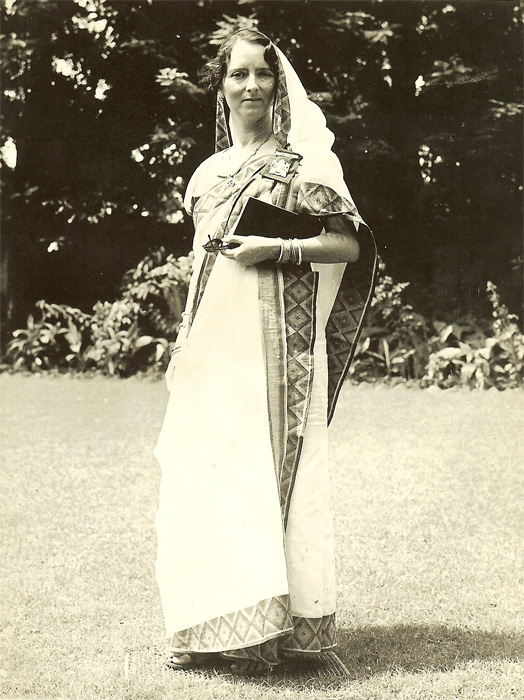 Savitri was devastated by the defeat of Germany in World War II. In June of 1945, near Varkala on the Malabar Coast, she resolved to kill herself by walking into the ocean.
Savitri was devastated by the defeat of Germany in World War II. In June of 1945, near Varkala on the Malabar Coast, she resolved to kill herself by walking into the ocean.

